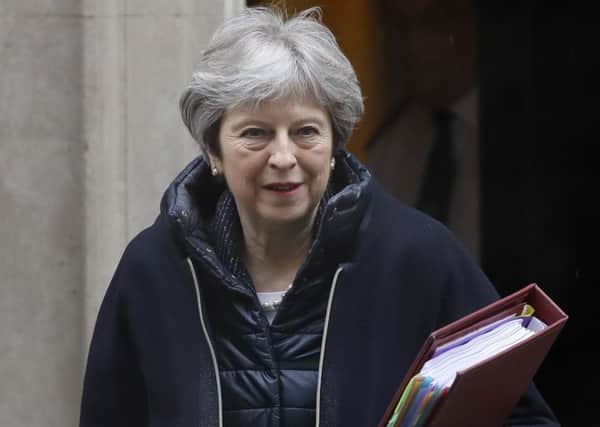Bill Carmichael: Theresa May's leadership qualities to the fore over Russia crisis


At the beginning of October, Theresa May’s world seemed to be falling apart – quite literally in some ways as the set at the Conservative Party Conference in Manchester collapsed around her.
Still reeling from her disastrous decision last year to go for a snap General Election, in which she lost her overall majority, she had just delivered what was widely described as the most calamitous conference speech in living memory, derailed by a prolonged coughing fit and a prankster handing her a P45.
Advertisement
Hide AdAdvertisement
Hide AdLabour was performing strongly in the polls and there was talk amongst Conservatives of a palace coup to defenestrate Mrs May – much in the way as the party had ruthlessly dispatched our only previous female Prime Minister, Margaret Thatcher, in 1990.
Even as recently as the beginning of this year, an attempted reshuffle by the Prime Minister turned into a risible farce and Cabinet ministers before and since have been dropping like ninepins – Fallon, Patel, Greening and Green.
The consensus among the political pundits was that Mrs May was pretty much finished and the only question was who was going to take her place.
Well, it doesn’t look like that at all today. If not triumphant, Mrs May’s reputation is seriously enhanced after co-ordinating the strongest international action against Russian aggression since the Cold War ended.
Advertisement
Hide AdAdvertisement
Hide AdThe Prime Minister, and her Foreign Secretary Boris Johnson, have managed to stitch together an international coalition to deliver a strong rebuke to Russia in the wake of the nerve agent attack in Salisbury.
At the last count more than 140 Russian diplomats have been expelled and the UK has received resolute support from 24 countries across the world including the US, the EU, Nato and as far afield as Australia.
As the Prime Minister told the Cabinet, it constituted “an unprecedented series of expulsions that has demonstrated to the Kremlin that we will not tolerate their attempts to flout international law, undermine our values or threaten our security”.
Some commentators suggested the UK would find itself isolated when we first expelled 23 Russian agents, but the opposite has in fact happened, and it is the Russians who have found themselves without support – except of course from among the ‘useful idiots’ of the extreme left, such as the leadership of the Labour Party.
Advertisement
Hide AdAdvertisement
Hide AdMrs May is not a natural campaigner, as was painfully demonstrated last year. She is stiff and formal with little in the way of natural warmth. She simply doesn’t do ‘touchy-feely’.
But it is in times of grave international crises like this that her qualities come to the fore – serious, resolute, in total command of her brief, spreading confidence with quiet efficiency.
Imagine for a moment that we had Jeremy Corbyn in Number 10 at the time of the Russian attack. Corbyn could hardly bring himself to utter a word of criticism about his ideological soul mates in the Kremlin, still less have the skill or inclination to rouse the international community to action.
Corbyn is too busy wallowing about in the filth of vile and racist Facebook groups to have much time for international diplomacy.
Advertisement
Hide AdAdvertisement
Hide AdAnd on the other big issue of the moment – Brexit – Mrs May and her team of negotiators have made significant progress of securing the UK’s orderly withdrawal from the EU.
The EU side – probably prompted by increasing signs of concern from German industrialists – seem to have finally realised that if they succeed in wrecking a trade deal, it will hurt them far more than it will hurt us. The first signs of an outbreak of common sense in Brussels can only be welcomed.
So things are looking up for Mrs May, but it could all still go horribly wrong, particularly in the May local elections and the Brexit vote later this year, with kamikaze Tory Remoaners seemingly prepared to destroy their own government.
And there’s another factor. When former Premier Harold Macmillan was asked what Prime Ministers most feared, his reply was: “Events, dear boy, events.” After the Russian attack, who knows what is around the corner.
But all in all Mrs May is in a far better place than anyone could have imagined back in October – and that is a good thing for our country.